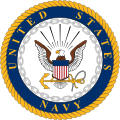This article needs additional citations for verification .(May 2022) |
| Patrol Squadron 31 | |
|---|---|
 VP-31 Unit Insignia | |
| Active | 30 June 1960 – 1 November 1993 |
| Country | |
| Branch | |
| Type | Squadron |
| Role | Training replacement aircrew and maintenance personnel for all Pacific fleet maritime patrol squadrons |
| Part of | United States Navy |
| Garrison/HQ | Naval Air Station Moffett Field, Sunnyvale, California |
| Nickname(s) | Genies (1962–1971) Black Lightnings (1971–1993) |
| Decorations | Meritorious Unit Commendation |
| Aircraft flown | |
| Patrol | P2V-5/SP-2E P2V-7/SP-2H P5M-2/SP-5B R5D-5/VC-54S R7V-1/C-121J UF-1/SHU-16B P-3A/B/C/TP-3A |
VP-31, Patrol Squadron 31 was a maritime patrol squadron of the United States Navy. [1] It was established on 30 June 1960 to train replacement aircrew and maintenance personnel. It was disestablished on 1 November 1993. [2]




